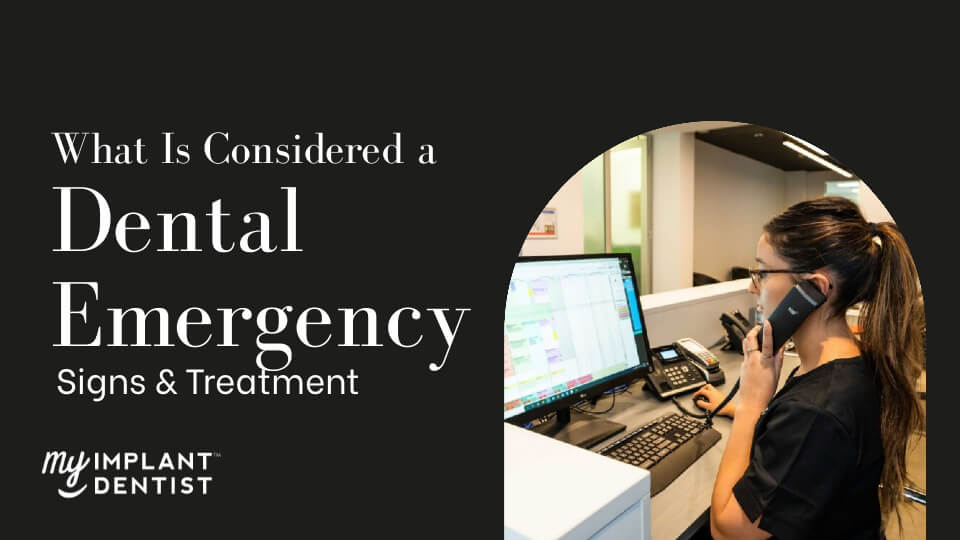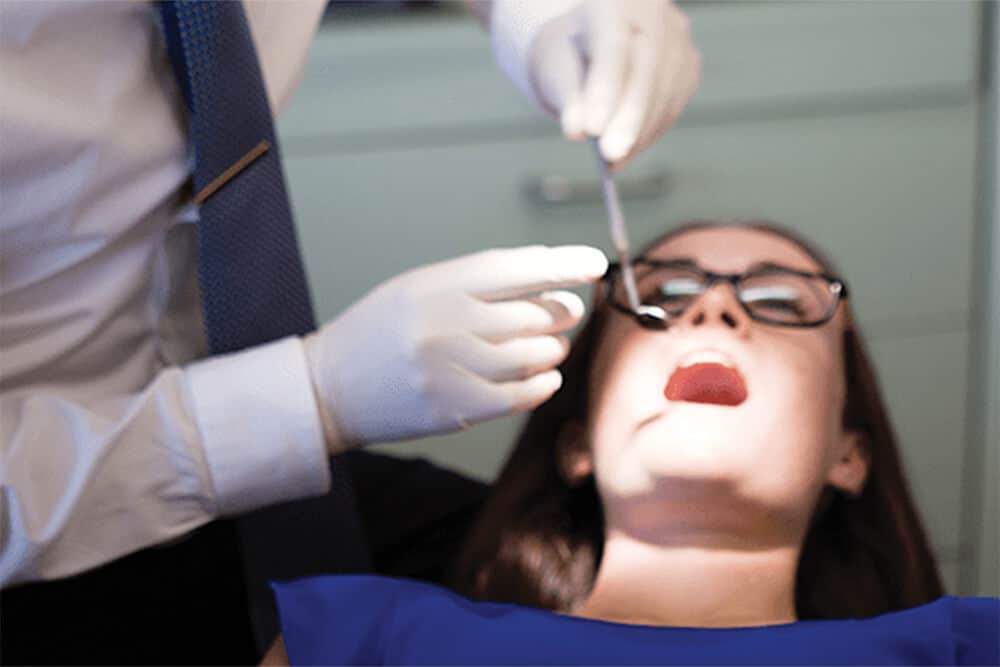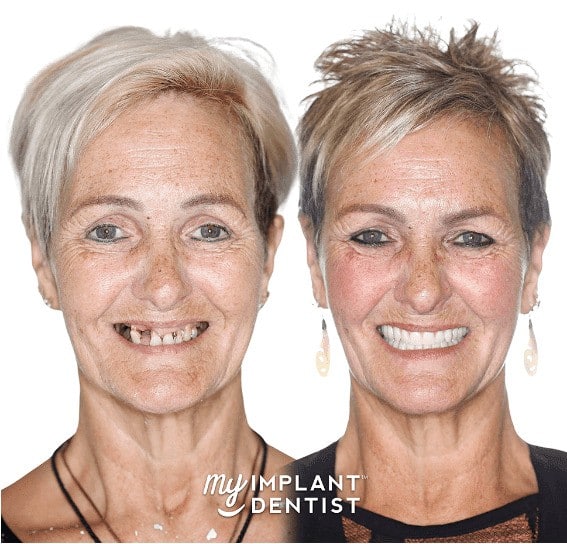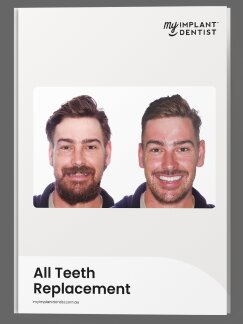
Contents
A dental emergency is a situation that requires immediate attention from a dental professional due to severe pain, significant damage to the teeth or gums, or a risk of permanent tooth loss. Examples of dental emergencies include a knocked-out tooth, severe toothache, chipped or cracked tooth, bleeding or aching gums, swollen jaw, or an abscessed tooth.
Not all dental situations are true dental emergencies. In this article, you will find out for yourself if that dental situation you experienced requires emergency dental care or not.
Key Takeaways:
- Dental emergencies can happen at any time and without warning.
- Some common dental emergencies include broken or chipped teeth, toothaches, lost fillings or crowns, and knocked-out teeth.
- Prevention is key, and simple steps such as practicing good oral hygiene, avoiding hard and sticky foods, and wearing a mouthguard during sports can reduce the risk of dental emergencies.
- If a dental emergency does occur, prompt and appropriate treatment is important to minimize pain and prevent further damage to the teeth and gums.
- The cost of emergency dental care can vary depending on the type of treatment required and the location of the dentist.
- Without dental insurance, the cost of emergency dental care can be quite high, ranging from several hundred dollars to thousands of dollars.
- Many dental insurance plans cover some or all of the cost of emergency dental care, so it is important to check your insurance coverage before seeking treatment.
- If you do not have dental insurance, there are alternative options such as dental savings plans, credit financing, and low-cost clinics to help you access affordable emergency dental care.
- It is important to have a plan in place for managing dental emergencies, including knowing who to call and what to do in case of an emergency. This can help ensure that you receive prompt and appropriate treatment and minimize the cost of emergency dental care.
What Is Emergency Dental Care?
Dental emergencies are issues that require immediate medical attention to correct, treat, and preserve oral health. They are potentially life-threatening and require urgent medical attention to control and alleviate pain.
Examples of common dental emergencies include:
- Uncontrolled bleeding,
- Trauma to the facial bone may obstruct an airway and make breathing difficult,
- A tooth abscess
- lacerations
- Chipped tooth
- Jaw fractures and dislocations
- Severe tooth decay or cavity
- Broken tooth from an accident
- Impacted wisdom teeth
- Urgent denture repair
Sometimes, the dental pain you feel may be more than ordinary. It could be more serious and life-threatening, so it is advisable to act quickly to avoid compounding issues. These dental issues often defy over-the-counter medications; the emergency room is your best option.
Signs You Need Emergency Dental Treatment
Determining if you need emergency care can be challenging. Here are a few signs to know when a condition is considered an emergency.
Knocked Out Tooth
If you experience a knocked-out tooth, take action by visiting a dental emergency clinic. Take the fallen tooth and its crown, and rinse gently. Then get a milk container or a glass of milk and place your tooth in it. Placing your tooth there helps to preserve the tooth.
You can also rinse your mouth in salt water a few times to reduce inflammation. After this, you can now take the tooth to your dentist, and if you act on time, you may be able to save the tooth.
A loose tooth can also be a sign of emergency dental care. A loose tooth indicates a tooth injury and requires immediate medical attention. A loose tooth can also be a red light for infections; your emergency dental care may include oral exams and X-rays to determine the infection’s cause and commence early treatment.
Chipped or Cracked Teeth
A chipped or cracked tooth becomes an emergency associated with severe pain, and the broken tooth fragments are still in the root. Sharp fragments in the mouth can cause damage. Therefore, it is best to demand emergency dental care to avoid causing further damage. When the tooth is chipped or cracked severely, it can cause intense pain.
You will need pain relievers like ibuprofen to help relieve pain. However, if there is not much pain, you can wait a few days to see the dentist.
Severe Toothache
The severity of your toothache can indicate that it is time to visit the emergency unit and get immediate relief. The toothache can indicate further dental issues and will only be discovered with your visit to the dental clinic. Don’t take all toothaches for granted; run to the nearest emergency clinic when the pain worsens.
Gums Bleed And Ache
Your gums bleeding after flossing can signify that all is not well. A bleeding gum can be an early sign of gum disease or gingivitis. If your gum bleeds are excessive, frequent, and aching, it is time to visit emergency dental care.
Swollen Gums
Swollen gums may indicate gum disease. Even though you don’t remember experiencing any mouth injuries, you can have swollen gums. It would be best not to disregard this for too long because the illness may spread to other bodily areas. You can apply a cold compress to reduce the swelling.
Abscessed Tooth
An abscess forms when the tip of the root becomes infected. Abscesses can cause severe pain and create other health complications. You may need to find yourself in the emergency room, and the solution can be either a root canal or an extraction.
An X-ray result will help with the prognosis. An abscessed tooth will require surgery to ensure the infection is drained and treated properly.
Take over-the-counter medications like acetaminophen or ibuprofen to help relieve the pain.
What To Do During Dental Emergencies

Not all cases are considered a dental emergency, but if you experience one or more of the signs above, you must receive emergency treatment immediately. Severe dental problems can lead to worse problems if left untreated immediately.
Book an appointment with your dentist if there is a dental emergency, or visit an emergency hospital. Your dentist may be able to tell you where you can seek care if he is not around. Otherwise, the emergency room is the next call. If no dental clinics are known to you at the moment, visit the hospital emergency department. They will direct you on further actions to be taken.
What’s Not Considered As A Dental Emergency?
Not all dental issues are dental emergencies; the following conditions are not considered dental emergencies;
- Routine checkups and cleaning
- Consultation
- Extraction of painless tooth
Cost of Emergency Dental Care
The cost of emergency dental care for simple procedures like fillings can range from $100 to $300, while more complex treatments like root canals can cost between $800 and $1,500. It’s important to consult with your dentist for an accurate cost estimate based on your specific situation. The cost of emergency dental care in Australia can vary depending on the nature and complexity of the procedure.
How to Prevent Dental Emergencies
Preventing dental emergencies is important in maintaining oral health and avoiding pain and discomfort. Here are a few tips to follow to prevent dental emergencies:
Maintain Good Oral Hygiene: Brush your teeth at least twice a day and floss regularly to prevent plaque buildup and tooth decay. This can help reduce the risk of developing toothache, gum disease, and other dental problems.
Wear Mouthguards: If you play sports or engage in activities that put your teeth at risk, consider wearing a mouthguard to protect your teeth from damage.
Avoid Chewing on Hard Objects: Chewing on hard objects, such as ice, hard candy, and popcorn kernels, can damage your teeth and increase the risk of a cracked or chipped tooth.
Visit Your Dentist Regularly: Regular dental checkups and cleanings can help identify potential problems before they become serious. Your dentist can also provide advice on how to maintain good oral hygiene and prevent dental emergencies.
Stop Grinding Your Teeth: Teeth grinding, also known as bruxism, can cause damage to your teeth and increase the risk of toothache, gum disease, and other dental problems. If you grind your teeth at night, your dentist may recommend a nightguard to protect your teeth.
Seek Treatment for Tooth Decay and Gum Disease: If you have tooth decay or gum disease, it is important to seek treatment as soon as possible to prevent the progression of these conditions and avoid the need for more serious and costly treatments.
By following these tips, you can reduce your risk of dental emergencies and maintain good oral health.
Conclusion
Dental emergencies can be scary, but immediate medical attention makes everything normal. You must know the signs that develop to determine if you are experiencing a dental emergency. Never procrastinate about any tooth pain or decide to push away any treatment you deem an emergency to a later date.
When not treated immediately, emergency dental issues can lead to other complications. The best way to prevent dental emergencies is to keep up with regular dental appointments with an experienced emergency dentist. It is advisable to find a dental clinic that offers emergency dental services in case of any emergency.
faq
Should I Go To The Emergency Room For Unbearable Tooth Pain?
If you experience unbearable tooth pain, you should visit the emergency room.
Will The Emergency Room Treat An Infected Tooth?
The emergency room can provide antibiotics for bacterial infections and transfer you to the hospital if needed.
When Is a Tooth Injury an Emergency?
A tooth injury becomes an emergency if you have suffered trauma to your mouth, an infection developed due to an injury, severe tooth pain, and uncontrollable bleeding.
What Are The Symptoms Of A Tooth Infection Spreading?
You will know if a tooth infection has spread if you experience the following symptoms; fever, swelling in your face, and trouble breathing.
What Is The Most Common Dental Emergency?
Toothaches are the most common dental emergency. They can cause unbearable pain.




















